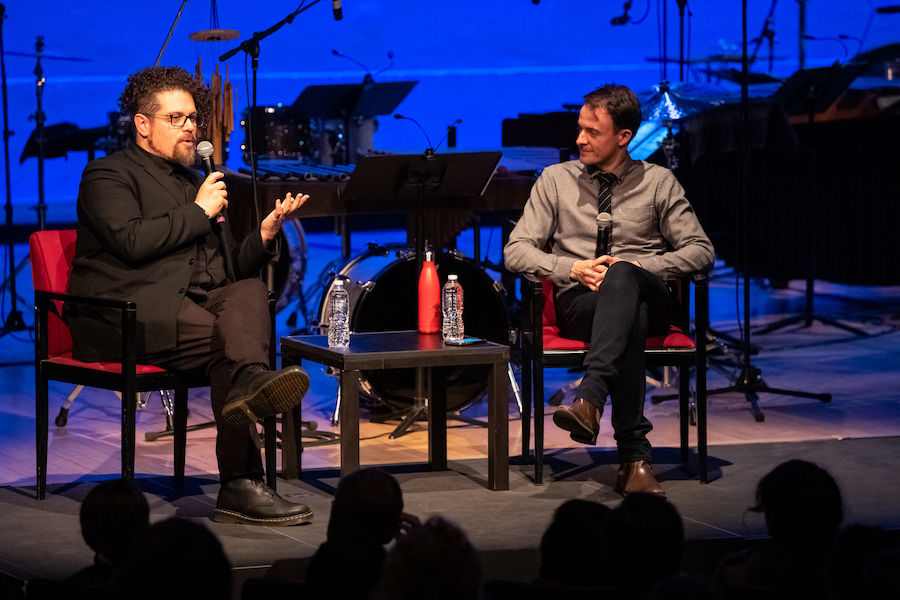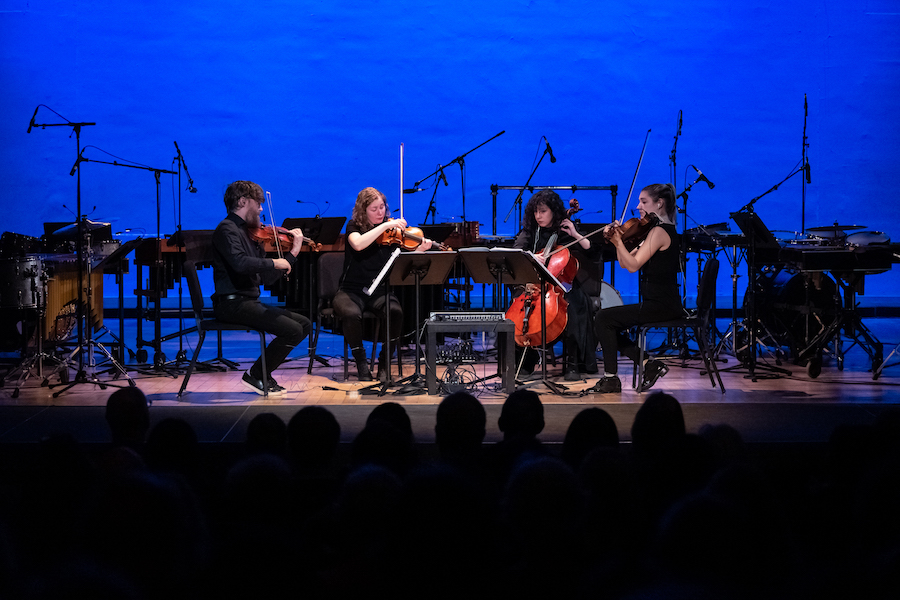In physics, when an object vibrates at a high enough speed it appears to be still to the naked eye. The range of movement becomes so infinitesimal that it’s imperceptible. Sound, an act of vibration unto itself, is performed across a range of movement that we’re able to perceive through hearing. Accelerate the speed of sonic vibration high enough and you’re left with silence – or, perhaps more accurately, you’re left with an unknowable sound.
Rounding out the Composer Portraits series at Miller Theatre on April 18, an evening of music by David T. Little fought for the unknowable with a ferociousness that has come to characterize Little’s visceral, voracious works. A kinetic mind, Little has an appetite that stretches not just across the breadth of ideas, but also across each idea’s own universe of vantage points. (Per the Miller Theatre’s program notes for the evening, he references The Hill, CNN, and even Breitbart to comprehend news events through their disparate takes.) His work becomes a scientific experiment beyond knowing the unknowable; it’s an epistemological quest to know the nature of knowledge itself.
Of course, as philosopher and activist Simone Weil notes in her Reflections on Quantum Theory, “Science is voiceless; it is the scientists who talk. And what they say is certainly not independent of time.”
Likewise, Little’s Composer Portrait was not independent of time, delivering a program that paired two works – 2010’s Haunt of Last Nightfall and 2013’s AGENCY – on the same day that the Mueller Report was released to the public in redacted form. Two works rooted in questions of knowledge and the unknowable suddenly gained an added resonance, although Little, while regarded as a politically active composer, downplayed the synchronicity.
If science, according to Weil, is an interpretation of experience, which “provides the data of problems but not a way of solving or even formulating them,” Little is less interested in finding solutions than he is in finding a formulation. He delights in then sharing that formula with an audience, to be experienced and interpreted in turn.
David T. Little in conversation with David Skidmore of Third Coast Percussion at Miller Theatre
April 18, 2019
Photograph: Rob Davidson for Miller Theatre

Take, for instance, Haunt of Last Nightfall, subtitled “a ghost play in two acts.” Written for and reprised last week by Third Coast Percussion, the work is as theatrical as the operas for which Little is best known, including the contemporaneously written Dog Days. In their own ways, both works deal with apocalyptic atrocities. As an adult, Little learned of the 1981 massacre at El Mozote, El Salvador, in which 900 villagers were murdered by U.S. military-trained and armed Salvadoran government forces. That this event had taken place in his lifetime (albeit when he was three years old), yet he only found out about it decades later, became Little’s personal ghost. (Coincidentally, the event was referenced by Ilhan Omar earlier this year.)
“First, how did I never know that this had happened? (The answer to this is fascinating and upsetting.),” Little writes in his composer’s note for the piece. “And second, why am I completely unable to get it out of my mind; to move on?… What we know shapes us, and whether I like it or not, I now know this.”
Even without knowing the historical details that motivate the work, it’s possible to understand the arc of catharsis it traces—and to layer one’s own experience onto the work’s interpretation. It was hard to hear the echo of chimes against a fiery drone in the second movement, “Between the Hammer and the Anvil,” and not think in passing of Notre Dame, given the week’s events. Nor was it possible to ignore the sonic connections between this movement’s industrial landscape and the aura of Fritz Lang’s Metropolis—which, as a favorite film of Joseph Goebbels, links Little’s work to another genocidal massacre that took place 40 years before El Mozote.
It’s this level of nuance that makes Haunt of Last Nightfall so compelling as an invitation to contemplation versus confrontation. There’s the violence of electric guitar drones (pre-recorded by Andrew McKenna Lee) cutting through marimbas and chimes. But there are also meditative moments, threaded with an embroiderer’s skill throughout the din of battery drums: Samuel Barber’s Medea by way of Beyonce’s Homecoming. Throughout all of it, Third Coast Percussion brings out the choreographic element of percussion work, each member performing in their sequestered station, but in a physical relationship to the others that transcended chamber music and became an act of gripping theater.
AGENCY, originally written for the Kronos Quartet and heard here in its New York premiere with members of the American Contemporary Music Ensemble, occupies a similar dimension in time and space. The question Little wrestles with here, however, isn’t around unknowing what we know already. Rather, prompted by Kronos violinist David Harrington, Little tries to know the unknowable—in Harrington’s words, “to spy on the CIA.”
Like the El Mozote Massacre, the Joint Defense Facility Pine Gap in Australia is a Cold War product in which the U.S. has a presence. The land in Australia’s Northern Territory sits a few hours away from an indigenous holy site, Uluru, which is believed by the local Pitjantjatjara Anangu people to be the home of their ancestors’ spirits. To understand the mysteries of religion is, as Little posits, as stymying as understanding the mysteries of politics and national security. As a result, the work turns to what we choose to believe in the absence of fact. To return to Weil, it’s impossible “to have any representation of truth which is not defective; but [we] must have one—an imperfect image of the non-representable truth which we once saw, as Plato says, beyond the sky.”
American Contemporary Music Ensemble (ACME) performing at Miller Theatre
April 18, 2019
Photograph: Rob Davidson for Miller Theatre

References abound, either deliberate – Little encoded a number of Easter eggs into pitch sets that then were incorporated into the backing electronic track, decipherable only through auditory manipulations – or atmospheric – moments of the work range in resonance from Tchaikovsky to Von Trier. Towards the end of the performance, Third Coast’s members returned to the stage, augmenting a codified cacophony that called to mind both war drums and a heartbeat.
This is Little’s reminder to us of history’s own pulsating and pervasive through-line. As we move from moment to moment, we may see the line as broken at these points of redaction. But there’s a larger perspective that history has and that we, as humans, will never fully know. Instead, we’re left to take it on faith that the thread is intact.
Both Haunt of Last Nightfall and AGENCY end with a final ecstatic release into silence when the performers lower their arms. While AGENCY doesn’t allude to an act of violence, its repetition of this ending structure recalls Last Nightfall and the insidious operations in which organizations like the CIA engage, to devastating effect. In the moment, I found myself thinking of the increasingly perfunctory moments of silence that accompany such tragedies.
If silence isn’t the absence of sound, but is in fact sound moving too rapidly to be discerned, what Little does with these moments is to offer us those rapid vibrations slowed down to a roar. What we then perceive as silence is only afforded to us at the end, when the frequency picks up again and we no longer can keep up. We’re left with a patina: not the truth, but what it leaves behind.
In posing these works as questions rather than condemnations, Little also offers a double-edged hope. Our unknowable potential as a human race may see us repeating previous atrocities and acts of colonialism. Or, we could be interdependent of time, honoring history’s ghosts and allowing our knowledge of them to shape us. As Ophelia says in Hamlet, “Lord, we know what we are, but know not what we may be.”
That, too, is a ghost play.
Olivia Giovetti has covered music and arts for Paper, the Washington Post, NPR, VAN, and beyond. She’s previously served on staff at Time Out New York and WQXR/Q2 Music, and her writing has been heard onstage at the Brooklyn Academy of Music as part of the Next Wave Festival. She combines her love of the arts and meditation practice on The Meditation of Art.
Classical music coverage on National Sawdust Log is supported in part by a grant from the Rubin Institute for Music Criticism, the San Francisco Conservatory of Music, and the Ann and Gordon Getty Foundation. The Log makes all editorial decisions.